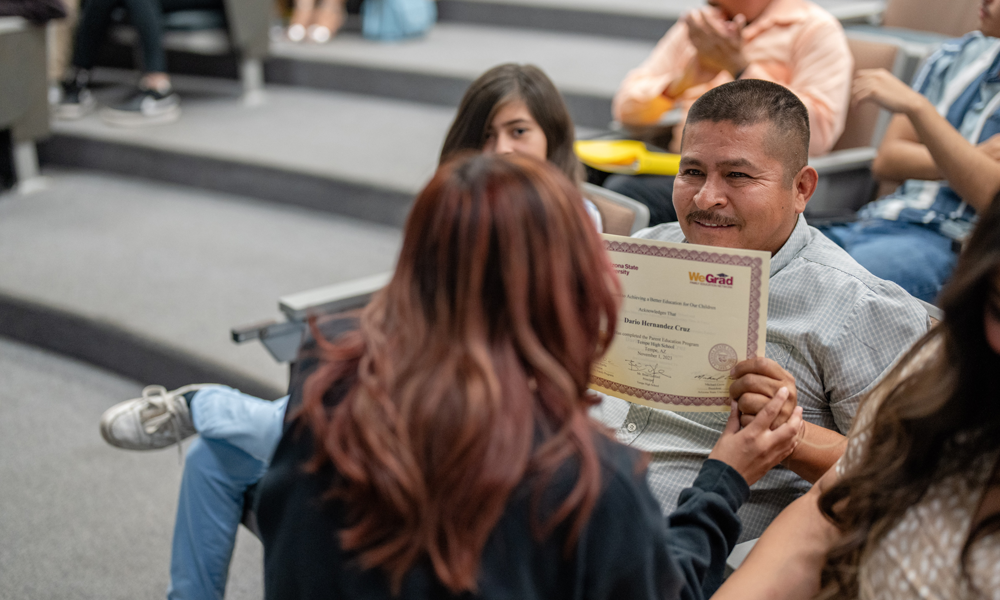You grad, WeGrad: College readiness made easier by Access ASU

College: a concept that looms in the back of the minds of all high school students, shrouded with a flurry of applications and anxiety. However, it doesn’t need to be a rushed, stressful time in your life. College readiness can start as early as elementary school. Arizona State University’s WeGrad program is here to help students from all backgrounds confidently enter the application process.
ASU’s WeGrad program started in 2006 under the name “American Dream Academy,” with the primary goal of elevating the success of students from underserved communities. Dr. Alicia Iñiguez, assistant vice president of outreach at Access ASU, commented on the program’s impact.
“It’s a college readiness program that focuses on engaging the parents in the education of their children and providing continuous support whether their student is in elementary, middle or high school,” Iñiguez said.
The program is divided into two primary modalities — in-person services and digital services. In-person programs are open for parents to enroll in and offered at local schools, enabling them to work hands-on in a collaborative environment with fellow parents.
Iñiguez explained the distinguishing features of in-person instructions.
“The time commitment is longer,” Iñiguez said. “Parents have to commit to completing two hours of class each week for six weeks. However, the curriculum goes deeper: they get to meet other parents and have in-person discussions, and they have direct contact with an ASU program facilitator who can answer their questions.”
Digital programming, called WeGrad-Digital, is a great alternative for families unable to fit in-person commitments into an already hectic schedule. Unlike in-person offerings, WeGrad-Digital can be completed in under 60 minutes.
It is available for families to complete through short, three-to-five-minute sessions on their cell phones.
Both modalities are fully available in English and Spanish. Iñiguez commented on how adapting these programs to various formats improves accessibility outcomes overall.
“Living in a community where many of our local families speak Spanish, it’s important to remove barriers to access information,” Iñiguez said. “We are being deliberate about meeting families where they are at. By offering this program in Spanish, we are increasing access to college preparation information.”
Early college preparation through ASU not only helps students better understand life as a Sun Devil but also teaches them how to develop an academic plan for themselves and their families. By setting standards early, students can naturally create active, attainable goals that lead toward college success.
“Getting ready for college is like any other project,” Iñiguez said. “It requires preparation, research, support, guidance and resources. The sooner students start to prepare for college, the better prepared they are if they need to pivot or make changes to their plan.”
One of the various issues that WeGrad hopes to combat is students missing required courses, unable to attend higher education as a result.
“College is a choice that every student should have access to make for themselves by knowing and meeting college admission requirements,” Iñiguez said. “Too often students don’t know the requirements or wait till their senior year to research them. By then, if students have not completed the appropriate courses, they may not to be admissible into ASU and will have to take an alternate path.”
The program is open to families and their students but predominantly focuses on how a family can support their children in preparation for university. Access ASU has established partnerships with local high schools to help connect families with all college-readiness opportunities ASU offers.
“We have partnerships with many local high school districts, including Tempe, Tolleson, Glendale, Peoria, Mesa, Phoenix Union, Chandler and Scottsdale,” Iñiguez said. “By having these partnerships in place, it positions our Access ASU programs and the school districts to collaborate on all the opportunities Access ASU and the university can offer to students as they prepare to succeed and enroll into higher education.”
Above all, the quintessential goal behind WeGrad is teaching participants how to maintain a mindset of ‘graduating together.’ While it can be easy to place all the responsibility on your student, WeGrad makes it equally simple to approach college as a family effort.
There are a myriad of other programs available through Access ASU that can set your student up for success:
- First Star Academy
Focusing on providing Arizona’s foster youth with the academic support, enrichment, and resources needed to succeed in college, First Star Academy is a free, highly accessible program that (much like WeGrad) focuses on improving academic outcomes for underserved students. Through First Star, students can participate in a variety of learning opportunities such as earning college credit for academic coursework and attending a two-week residential summer experience. In addition, students will be able to engage with peers through field trips, recreational events, service learning and caregiver workshops.
- Leverage AZ
Leverage AZ “connects diverse talent to postsecondary education and career opportunities that match the workforce needs of the new Arizona economy.” This program is divided into four primary categories: High School Learner, Community College Transfer, Job Placement for Degree Completers and Upskilling.
- Hispanic Mother-Daughter Program
With an emphasis on middle and high-school-aged students, the Hispanic Mother-Daughter Program works to “increase the number of first-generation Arizona students who are qualified and prepared to enroll at Arizona State University through direct family involvement.” Although the program was originally started for Hispanic mothers and their daughters, it has since opened to all students and their parents/guardians. This program requires a five-year commitment, with both digital and in-person programs beginning in 8th grade.
To learn more about these and even more academic readiness programs, visit Access ASU.